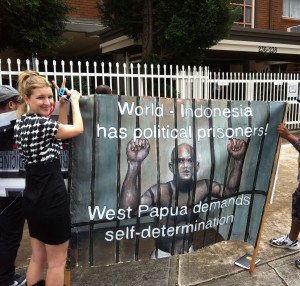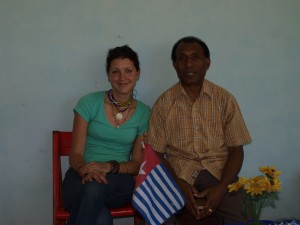By guest contributor Camellia Webb-Gannon, Research Fellow, University of Western Sydney
Despite occupying the western half of the island of New Guinea, located upon Australia’s doorstep,” West Papua is frequently referred to as far-flung, isolated, remote, and exotic. It has gained this reputation due to the cloak of secrecy within which it is draped by the Indonesian government, which bans foreign journalists and NGOs from entering the territory, and also because of its remarkably rugged terrain, which poses challenges for prospective travelers.

When I give public lectures and when I speak privately about West Papua and the conflict that has dogged its people and lands for five decades, the question I am commonly presented with is Why West Papua?, the implication being that West Papua’s location and under-reported conflict is an eccentric choice for a researcher. While many anthropologists or conflict analysts choose to study a particular geographical area as a case study to further their disciplinary or theoretical work, I entered academia specifically as a means to learn more about, and advocate, for West Papua.
I grew up in Papua New Guinea with an ethnomusicologist father and developed an appreciation for things Melanesian from an early age. When my work in international development and HIV prevention took me to East Timor in the mid 2000s, I was struck by the similarities between East Timor’s and West Papua’s history of occupation, the difference being that West Papua had yet to emerge as an independent state. At the 2005 Pan-Pacific HIV/AIDS Conference in Auckland, New Zealand, I was struck by the absence of HIV in West Papua—a very real concern—as a conference topic. Despite disproportionately affecting and infecting West Papua’s Melanesian population, HIV was considered by conference organizers to be an Asian epidemic. Meeting West Papuan activist Dolly Zonggonau at this conference piqued my interest in other structural injustices impacting West Papuans. I resolved to pursue PhD studies on the challenges facing West Papua’s independence movement in the hope that my research skills would be useful for increasing knowledge about paths to peace with justice for West Papuans.
Being a professional academic activist is a privilege, particularly when so many West Papuan life-long activists with distinguished educations face threats of violence or worse when peacefully expressing their desire for merdeka, or freedom. My article for Anthropoligica, ‘Merdeka in West Papua: Peace, Justice, and Political Independence,’ is an attempt to use my privileged academic position to disseminate West Papuan leaders’ ideas about what merdeka means to them, and what a future shaped by merdeka might look like. It draws on interviews with three generations of West Papuans living in dispersion in seven countries, and argues that merdeka for West Papuans implies a state of governance characterized by peace with justice, with political independence as its baseline. The argument has two prongs. It argues from a top-down, international human rights law perspective that self-determination is a human right, and that peace with justice necessitates the fulfillment of fundamental human rights. It also argues from a bottom up, grassroots ethnographic perspective that West Papuans believe that peace with justice necessitates independence, and that they cannot realize collective or individual self-actualization until they are in a position where they have the choice to determine their own political future.
A compelling theoretical and ethnographic case can be put forward, but does it have any utility for advocacy purposes? This is something I have been reflecting on lately, as the recent election of a relatively democratically-minded  Indonesian president, Joko Widodo, ironically makes the likelihood of political independence painfully remote. (If the tyrannical General Prabowo Subianto had been the victor, West Papuans’ pleas for international assistance would arguably have reached a more receptive international community). If, under Widodo West Papua becomes comparatively more open—political prisoners might be granted amnesty, for example, or the provinces might be accessible to international press, which would be welcome improvements, certainly—would this detract from the integrity of West Papuans’ right to self-determination? Or, even if conditions do not improve for West Papuans, but the apparent futility of pursuing West Papuans’ right to choose self-governance continues to grow, should international supporters of their right to self-determination desist and instead focus on campaigning for more achievable, limited human rights for West Papuans?
Indonesian president, Joko Widodo, ironically makes the likelihood of political independence painfully remote. (If the tyrannical General Prabowo Subianto had been the victor, West Papuans’ pleas for international assistance would arguably have reached a more receptive international community). If, under Widodo West Papua becomes comparatively more open—political prisoners might be granted amnesty, for example, or the provinces might be accessible to international press, which would be welcome improvements, certainly—would this detract from the integrity of West Papuans’ right to self-determination? Or, even if conditions do not improve for West Papuans, but the apparent futility of pursuing West Papuans’ right to choose self-governance continues to grow, should international supporters of their right to self-determination desist and instead focus on campaigning for more achievable, limited human rights for West Papuans?
Such questions prompt me to ponder the utility of radical research; when I posed them recently to a friend and experienced West Papua human rights advocate, he reminded me that one should not grow weary of standing up for what is right, simply because one is in an apparently ever shrinking minority regarding the issue. Human rights should not be treated according to the whims of fashion, taken up or abandoned based on preference or convenience. All that is necessary for evil to triumph—for human rights to become obsolete—is for concerned people to do nothing, to paraphrase Burke. And miracles do occur, as the case of East Timor testifies. It is of course important not to be single-focused; strategic wisdom dictates that the more achievable gains be sought after as West Papuans walk their long walk to freedom. As the article articulates, it is unlikely that West Papuans will relinquish their dream—and right—to self-determination. However unobtainable their goal might appear now, it is a right and good thing for onlookers, members of the academic community included, to share the journey with them.
Read Camellia Webb-Gannon’s article Merdeka in West Papua: Peace, Justice and Political Independence in the most recent issue of Anthropologica
Comments on this entry are closed.